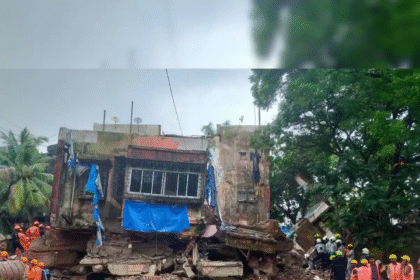Be Careful With Your Words,” Shiv Sena MLA Warns BJP’s Nitesh Rane Amid Growing Maharashtra Political Tensions
Maharashtra’s political arena has once again become a hotbed of controversy, and this time, the spotlight is on a verbal spat that may have broader implications than it first appears. Shiv Sena MLA Sanjay Shirsat recently issued a stern warning to Bharatiya Janata Party (BJP) leader Nitesh Rane, stating he should “be careful with your words.” The statement, while brief, is charged with tension, reflecting a growing discomfort within the current alliance between the BJP and Shiv Sena (Shinde faction).
As Maharashtra moves closer to the Assembly elections in 2024, this exchange between allies is more than just political posturing—it’s a clear sign of deepening cracks in an uneasy coalition that has held power through compromise rather than consensus.
Who Said What: The Exchange in Focus
The remark came after Nitesh Rane made statements that were considered disrespectful towards Shiv Sena leaders, including direct or implied jabs at internal party matters and leadership styles.
Sanjay Shirsat, MLA from the Eknath Shinde-led faction of the Shiv Sena, responded forcefully:
“Be careful with your words. Political criticism is fine, but when you cross the line into disrespect, there will be consequences.”
While Shirsat did not specify the exact statement that triggered this warning, the context makes it clear that Rane’s comments were perceived as undermining the dignity and autonomy of Shiv Sena leaders, especially those aligned with Chief Minister Eknath Shinde.
Background: A Complex Alliance Built on Fragile Trust
To understand the significance of this incident, it’s crucial to trace the complicated history of Maharashtra’s political realignments over the past few years.
2019: The Beginning of the Rift
- The 2019 Maharashtra Assembly elections saw the Shiv Sena and BJP contesting together, only for the alliance to break post-results due to disagreements over the CM post.
- Shiv Sena (Uddhav Thackeray faction) then joined hands with Congress and NCP to form the Maha Vikas Aghadi (MVA) government, surprising many.
2022: Shinde’s Rebellion and BJP’s Return
- In June 2022, Eknath Shinde led a revolt, splitting the Shiv Sena and forming a new government with the BJP.
- Eknath Shinde became CM, while Devendra Fadnavis became Deputy CM, signaling a return of BJP power, albeit under a different structure.
Present Day: The Uneasy Alliance
While both parties continue to publicly support each other, multiple disagreements, public rebukes, and leadership clashes have marred their working relationship. The recent incident involving Nitesh Rane is just the latest symptom of a partnership that lacks ideological cohesion and internal discipline.
Who Is Nitesh Rane?
Nitesh Rane is not just a BJP MLA; he’s also the son of Union Minister Narayan Rane, a former Shiv Sena member turned Congress leader, and now with the BJP. Known for his aggressive and provocative political style, Nitesh has built a reputation for making controversial statements that often draw criticism—even from within his own party.
His political career has been defined by:
- Direct attacks on opposition figures, especially from the Shiv Sena (Uddhav faction).
- Public confrontation tactics and viral social media posts.
- A bold stance that occasionally goes beyond party lines and diplomatic norms.
Shiv Sena’s Stand: A Matter of Dignity
Sanjay Shirsat’s warning may seem like routine political posturing, but it is deeply tied to Shiv Sena’s evolving identity post the 2022 split.
Here’s what makes it significant:
- Restoring dignity: Post-split, the Shinde-led faction has struggled to gain legitimacy and grassroots trust. Standing up to BJP figures helps rebuild credibility.
- Electoral positioning: By warning Nitesh Rane, Shiv Sena can signal independence and strength to its voter base.
- Internal politics: With local elections approaching, every leader wants to position themselves as defenders of the party’s legacy, especially Bal Thackeray’s ideology.
BJP’s Position: Silent Calculations or Strategic Control?
Interestingly, BJP top brass has maintained strategic silence on the incident. This silence could suggest several things:
- Internal disapproval of Nitesh Rane’s rhetoric, but unwillingness to publicly censure him.
- A deliberate attempt to keep alliance partners in check by allowing certain leaders to push boundaries.
- An effort to project strength without direct confrontation, knowing the alliance is more beneficial than risky at this stage.
For the BJP, which aims to maintain control at both the state and national levels, managing allies like Shinde’s Shiv Sena requires balance—assertive yet not alienating.
Implications for Maharashtra Politics
This episode, while seemingly minor, could have major implications:
1. Widening Rift Ahead of Elections
With Assembly elections expected in 2024, parties are now recalibrating alliances and vote banks. The Shiv Sena (Shinde faction) and BJP alliance may face stress as:
- Local leaders want more autonomy.
- Grassroots workers are disillusioned by internal clashes.
- Public perception starts questioning the alliance’s stability.
2. Uddhav Thackeray’s Shiv Sena Gains Moral Ground
Every visible crack in the BJP-Shinde alliance strengthens Uddhav Thackeray’s faction, which presents itself as the “real Shiv Sena”. They continue to remind voters of how the BJP allegedly “betrayed” their long-standing ally.
3. Impact on Urban Local Body (ULB) Elections
Upcoming municipal polls in Mumbai, Thane, and Pune will test the alliance’s unity. Public disagreements like this may lead to:
- Vote splitting among alliance partners.
- Independent candidates rising due to alliance fatigue.
- Reduced voter turnout, due to confusion or lack of faith in the current setup.
Media and Public Reactions
Media Coverage
- National and regional news outlets picked up the exchange quickly.
- TV debates questioned if this was a signal of an impending breakup.
- Political analysts highlighted that such outbursts are often used to negotiate power dynamics behind the scenes.
Public Sentiment
- On social media, many users criticized the immaturity of alliance leaders for fighting publicly.
- Others praised Shirsat for standing up to perceived BJP arrogance.
- Youth voters expressed fatigue over constant infighting instead of developmental discourse.
Political Alliances: Marriage of Convenience?
India’s regional politics, especially in states like Maharashtra, are increasingly defined by alliances of convenience rather than ideology. While such arrangements help gain power, they often:
- Struggle with internal contradictions.
- Depend heavily on top-level diplomacy, failing at local governance levels.
- End up alienating the voter base, who often voted for a particular ideology or promise.
In this case, the BJP and Shiv Sena (Shinde) are tied more by strategic necessity than shared vision, and public spats like this highlight the fragility of such arrangements.
What Comes Next?
While it’s unlikely that this single warning will break the alliance, it is a sign of growing restlessness within the Shiv Sena ranks. As both parties prepare for crucial elections, the following scenarios are possible:
- Controlled damage: Senior leadership might call for a truce behind closed doors.
- More public confrontations: If differences are not addressed, similar incidents may become frequent.
- Alliance restructuring: Closer to elections, ticket distribution or local candidate selection may trigger larger conflicts.
- Soft split strategy: Both parties might campaign “together but separately” to retain core vote banks while appearing independent.
Conclusion: A Warning Worth Heeding
The remark by Sanjay Shirsat may have been just 6 words—“Be careful with your words”—but in Maharashtra’s volatile political climate, those words carry the weight of suppressed frustrations, unfulfilled promises, and competitive egos.
As BJP and Shiv Sena (Shinde) navigate the bumpy road toward 2024, episodes like these will test their discipline, diplomacy, and durability. For now, the warning has been issued—not just to Nitesh Rane, but to every leader who believes alliances can be taken for granted.
In Maharashtra, political words are never just words—they’re signals, strategies, and sometimes, storm warnings.
Read Also : Top 7 Shocking Revelations in the Meghalaya Honeymoon Murder: Rakhi Brother Exposed as Killer








